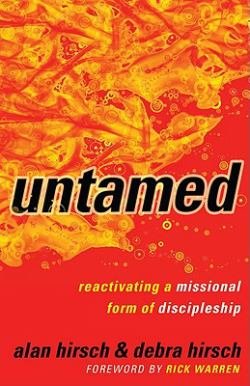
If we’re honest, many of us treat the Holy Spirit more like a silent partner than the third person of the
Trinity. We are so cautious of the Spirit that we eliminate him from our leadership. Instead of relying on the Holy Spirit, church planters often rely on one of two directions to plant churches: apostolic moxie or academic models and methods. When we lean on either of these, we lean away from the Spirit-led center of church leadership.
Reliance on Apostolic Moxie
Moxie is that self-starting, self-motivating quality, often present among entrepreneurs, which enables them to push through the odds of failure with a determination for success. When moxie is linked up to apostolic gifting, you get a type-A church planter. Sin results when we possess moxie without humility—a determination to plant and lead the church without leaning on the wisdom of others. The planted church will likely be unhealthy. Why? The church is treated like a task to be executed, not a people to be shepherded. It was planted in dependence on yourself not dependence on the Spirit. It’s planting by making little of the Spirit and much of yourself. Church planting takes more humility than it does moxie. We need less moxie and more Spirit.
Discernment in Planting Location
Self-reliance in planters is often expressed in a of lack discernment. Instead of asking “What is the Spirit already doing in this city, town, and village?†moxie-driven planters barrel into town with a “vision from God†and in the process burn their family, polarize their community, and disregard their city. Planters that depend on the Spirit, however, learn to listen to others, to God, and to the city.
Reliance on Academic Models
There also are planters who, instead of relying on self-determination, rely on information. They diverge from the Spirit-led center by resting on academics or personal knowledge. Those who depend on models and methods are, perhaps, more submissive to God’s call, but slowly attach their significance and success as a planter to what they know and not to God’s calling. They think to themselves: “if I learn enough then I’ll be ready to plant.â€
Discernment in Mission
You have a plan to reach your city. That plan does not include the Holy Spirit; it includes your research. You pull out your strategic plan and your church planting model and methods and say: “This is what God is doing in the city.†You over-think and out-plan the Holy Spirit. What we need is fewer books and more prayers.
The Spirit Leads through (and away from) Methods
Following the Spirit does not mean we abandon methods and planning. The Apostle Paul clearly had a strategy for planting churches in urban centers, spinning his disciples off to lead and plant in rural areas.
When I arrived in Austin I was armed with a prospectus and timeline. I was also ready to protect my wife, son and baby to be in the womb. As if all that wasn’t enough change, I soon  discovered a different church planting methodology. A friend told me I was more wired for Organic Church. I had previously blown off a lot of Neil Cole’s writings because of his weak church governance and polity. As I began to read Organic Church, however, I became convinced of the value of decentralized church and its fit for urban Austin. Indie church for an indie city.
As much as I like the word “organicâ€, I began to realize that it was not a process but a Person that was guiding me in all of this—the Holy Spirit. It is the Spirit who creates and directs the church, not models (organic or traditional). The Spirit should be free to change your expression of ministry, the way you plant Christ’s church.
The Spirit Leads through Suffering
Expect the Spirit to lead you into unplanned change in order to accomplish the mission of God. For example, Stephen’s stoning led to the Eastward expansion of the Church (Acts 7; 11:19). Paul’s planting strategy was directed westward, towards Rome. If we had stuck with methods, only half the globe would have heard the gospel, but the Spirit made sure that the church expanded eastward through the martyrdom of Stephen. The blood of the martyrs made church planting a global movement. It was unplanned change, suffering. How many of us have martyrdom written into our church planting timeline? How will you respond when suffering comes? Will you ask the Spirit for direction when it comes, or will you blow through in moxie or ignore it by taking methodological detours around the God-ordained suffering?
Conclusion
Planting churches isn’t meant to happen by might or by power but the Spirit of the Lord (Zech 4:6). We need planters that are less pridefully cautious and more open to the leading of the Holy Spirit. When we open ourselves up the Spirit’s leading, remarkable things can happen on the mission of Christ!
See the audio and notes from the original Acts 29 talk: Spirit-led Ecclesiology
For more on the Spirit check out Winfield Bevins booklet.


 m getting rocked on discipleship these days. From my positive experiences in the pub, in the projects or in God’s presence to a deepening desire for more disciples, more discipleship, more life sharing on mission. God is using the Hirsch’s book to call me into deeper missional discipleship—making disciples while on mission.
m getting rocked on discipleship these days. From my positive experiences in the pub, in the projects or in God’s presence to a deepening desire for more disciples, more discipleship, more life sharing on mission. God is using the Hirsch’s book to call me into deeper missional discipleship—making disciples while on mission.